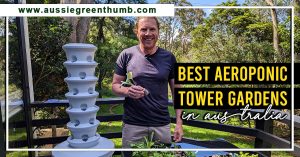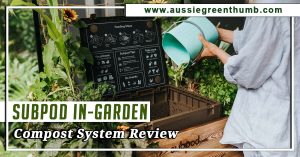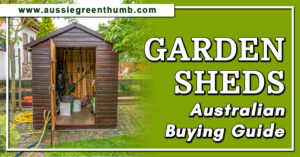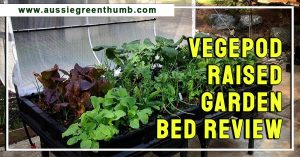If you’ve got limited space, or just want to make the most of every surface in the garden, there’s no better solution than the best vertical garden planters. We, like most gardeners, are obsessed with greenery.
There is never a limit on filling spaces with as much life as possible, and it was pretty early on in our garden design journey that we became pretty obsessed with vertical garden planters.
In this article we’re going to run through some of the best vertical planters you can buy, and talk a little about how to use them, and the best plants to grow in vertical planters in Australia.
More...
Top Pick

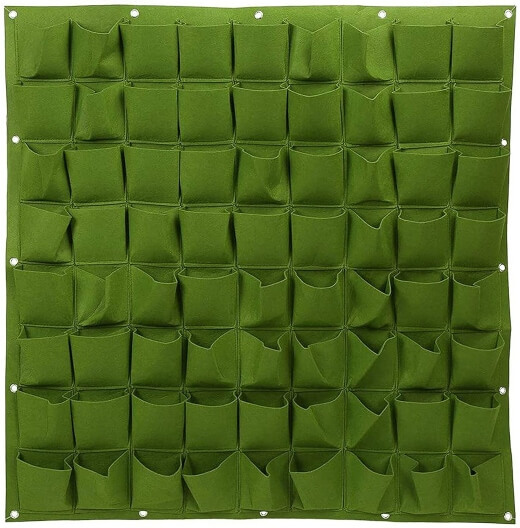
Premium Choice

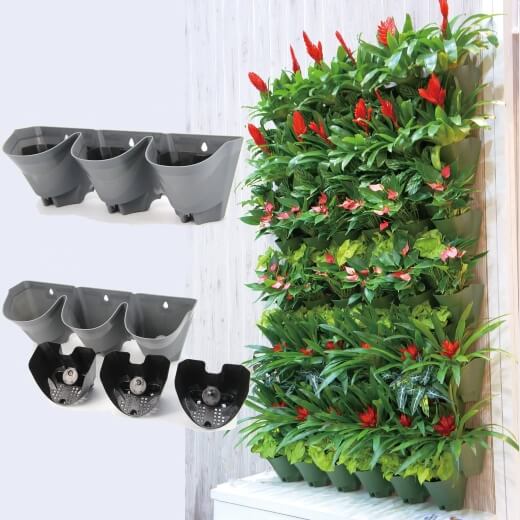
Best Value

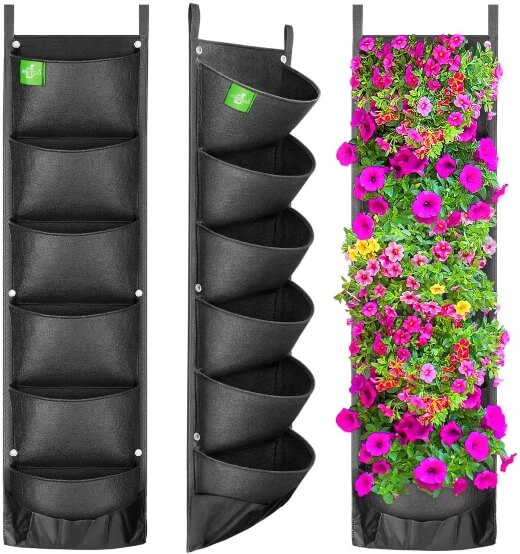
Best Vertical Garden Planters for 2024
Product | Our Rating | Price | |
|---|---|---|---|
1. 72 Pocket Vertical Wall Garden Planter | 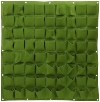 |  | |
2. Worth Self Watering Vertical Wall Planter | 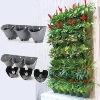 |  | |
3. ANGTUO Vertical Garden Planter |  |  | |
4. Trend Hutch Garden Vertical Garden Wall Planter |  | ||
5. AgroSci Garden Wall Planter Kit |  | ||
6. Watex Metal Mounted Green Wall Vertical Planter |  | ||
7. Watex Mounted Green Wall Mini Vertical Planter | 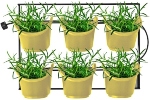 |
What is Vertical Gardening?
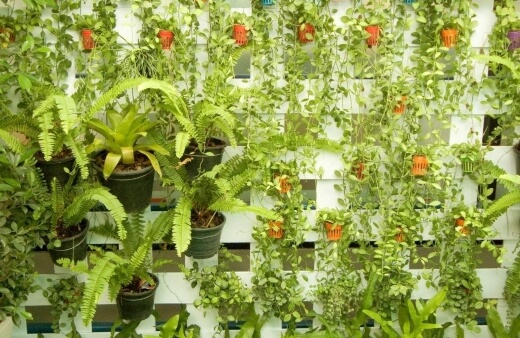
Vertical gardens are essentially built up of wall planters or pots, attached to the wall. They allow for unused space in the garden to be turned into fragrant, floral walls, or even used as a productive vertical vegetable patch. It also works well with apartment gardening.
While it’s possible to build your own vertical planter, it’s usually more cost-effective (and safer) to buy a readymade vertical planter kit, which we’ll talk about a little later too, but whatever option you choose, you’ll need the right plants…
How to Choose the Best Vertical Gardens Plants
There are three things to consider with vertical planters, especially in Australia where droughts can hit hard, and any container planting needs to be able to cope with dry soil and high temperatures.
Finding the best plants for vertical gardens means following three basic rules:
- Sun-loving
- Wind resistant
- Drought tolerant
Obviously this isn’t the strictest rule (and rules are made to be broken), so if you can find a well-shaded wall that doesn’t get too much sun there’s no limit to the type of plants you can include in a vertical garden.
Best Plants for Vertical Planters
Drought tolerant native plants like pelargoniums are incredible for vertical gardens, but so are Mediterranean herbs, which are built to withstand serious droughts, and can even put up with direct winds.
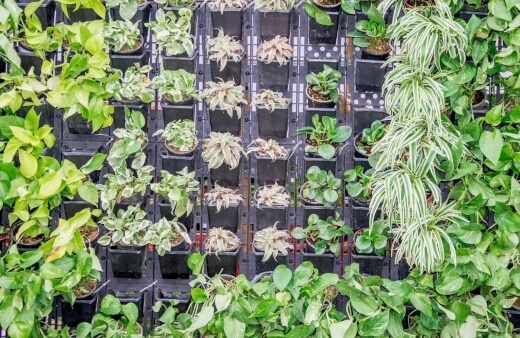
Best Ornamental Plants for Vertical gardens in Full Sun:
All of those plants are tried and tested by us, and we know they work well in full sun on living walls. Some of them, particularly succulents and the tuberous perennials are adapted for dry conditions and store water in their roots or their leaves so they can still thrive in the dry season.
Others, like ivy, Fuchsia and lobelia are just incredibly tolerant of almost any conditions and look gorgeous trailing over the edge of wall planters.
Best Ornamental Plants for Shaded Vertical Gardens:
When it comes to shade, things are much easier to manage, and there’s a much wider range of colours to choose from, from bright red heucheras, providing fluffy clouds of flowers, or trailing vinca with blue star-shaped flowers hanging right down your wall.
Best Herbs and Vegetables for Vertical Gardens:
When you’re planting into wall pockets or full vertical garden planters, there are a few reliable options for edible plants, but basically, if it grows in the ground, it will grow on the wall.
Our favourites are trailing bush tomatoes (find more about bush tomatoes here), like Hundreds-and-thousands, which are really productive throughout Australia, and with regular watering will give an abundant crop as well as masses of trailing flower and foliage.
Try some of these edible plants for your vertical garden:
Vertical Garden Planters Buying Guide
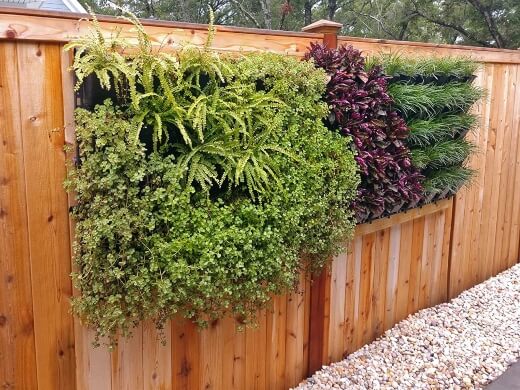
Source: amazon.com.au
What to Look for When Buying a Vertical Planter
Before choosing a vertical planter, there are loads of styles you need to get to know. Below, we’ll explore the most common designs of vertical garden planters, as well as how to install them.
Some planters are as simple as a few screws and hooks in the wall, while others need a little bit more attention. Often the vertical planters that are hardest to install are the best products though, as they tend to include water reservoirs and much sturdier containers.
Different Types of Vertical Garden Planters
From the most subtle pot systems to vertical garden planters to cover entire walls, there are big jumps in prices, quality, and practicality with all types of the vertical garden planters. Let’s take a look at the most common designs:
Vertical wall planters
Vertical wall planters are essentially window boxes that attach easily to your wall. They’re easy to install, but can be quite low impact. If you just want a manageable extension to a patio though, vertical wall planters are a quick and simple way to add plenty of space to the garden without too much effort.
For the best vertical wall planters, make sure they can hold a decent amount of soil, and are made from durable long-lasting materials like recycled plastic, resin, or treated hardwood.
Some vertical garden planters have water reservoirs too, which will save you time and money meaning you need to water less, and the containers store rainwater for you.
Vertical garden pots
Vertical garden pots add drama to a blank wall and can be a beautiful contemporary addition to any garden. They take their inspiration from classic auricular theatres, which saw the Victorian working classes filling tiny gardens with shelves to display collections of delicate specimen plants to show off to their friends.
Today, vertical garden planters just make a really useful herb garden without taking space away for the patio. For the best vertical garden pots, choose something that’s a good size to fit somewhere near the kitchen, making sure you get plenty of use out of them.
Vertical garden kits
Vertical garden kits are by far the most practical use of space, and can fill up an entire wall on a budget, or, if you go high end, they can range anywhere from $50 to $5000, but these kits are modular, so you only need to buy what you need.
Some vertical garden kits are made of felt, plastics or fabrics and hang easily from a few basic hooks, making them really easy to install, but you’ll need to add plenty of compost and if you set them up in full sun they’ll need water retention crystals too, which will help reduce water loss as these budget vertical planter kits tend not to have reservoirs included.
How to Install a Vertical Planter
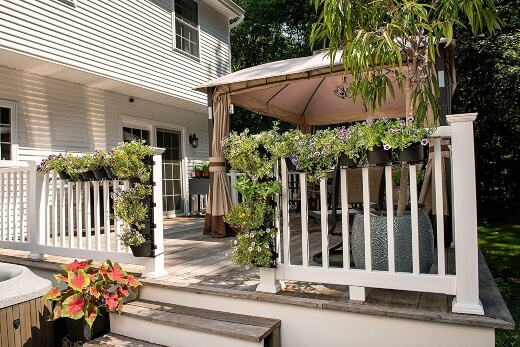
Source: amazon.com.au
Installing a vertical garden planter varies depending on the kit you choose, but there are a few tools you’ll need to get started to install any hanging planters on masonry or timber.
Tools for installing vertical garden planters:
- Hammer drill - check out our review of the best hammer drills for 2024.
- Wall plugs
- Compost
- Water retention crystals
- Outdoor screws (60mm are usually long enough)
- Tanalised timber battens (optional)
Method:
Start by measuring your vertical garden planter, and make sure it will fit the intended wall comfortably. When you know your planter will fit where you want it, you need to decide if your wall (particularly the outer render) is strong enough to support the weight of a filled planter.
Drill 40-50mm into the wall with a 6mm drill bit, then insert a 40mm wall plug. Either attach a batten to the wall using 4x60mm screws or attach the planter directly for a neater finish using 4x45mm screws.
Fill your vertical garden planter with a mix of compost
Basics of a DIY Vertical Garden
The Frame – for longevity a metal frame is possibly the best option but treated wood can also outlast the vigour of running water.
The Backboard – PVC sheets are the preferred option but can be substituted with fine, rigid wire mesh (preferably stainless steel).
The Holding Sheet – a thick sheet of felt will give the best results but a tough hessian can also work well.
The frame is basically the support for the vertical garden. On it, the backboard is adhered, fastened or riveted and then the holding sheet is stapled on top of that.
For indoor applications, you can make a well at the bottom with a continuous feed pump moving the water back up and then filtering down through the plants via gravity. The water is usually filled, and refilled with nutrients that sustain the plants.
If you decide to hang this outdoors then you can do away with the bottom well and just hand water the plants with a watering can.
Basically, the principles of hydroponics are used in this technology so no soil is used for plant growth. Plants are neatly embedded and suspended into the felt which becomes its growing medium.
Vertical gardens can be as simple or as complex as you choose. They can offer you another dimension to growing your plants or they could become living works of art that transform your backyard, balcony or patio.
Regardless of how you start one, a vertical garden is a real possibility for any home gardener.
Vertical Wall Planters Safety Guide
We’ve given some basic instructions for hanging any vertical planter, but it’s incredibly important to follow the direct instructions on your own product. Different products will require stronger wall plugs, longer screws, and different specifications of battens.
For balcony gardens, it’s essential to check weight regulations with your planning officer to make sure your balcony can handle the added weight of a vertical planter.
How to Maintain a Vertical Garden Planter
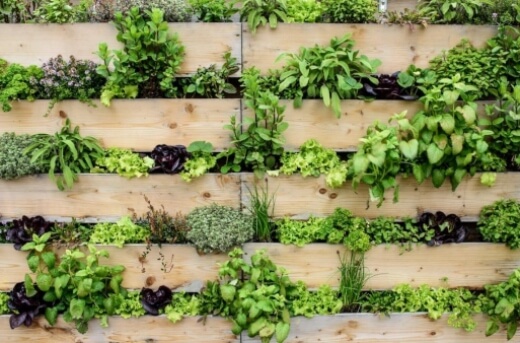
Plants in vertical planters need constant water. If you’ve added water retention crystals to the mix, you’ll have to water about as often as you water your pots. If not, water at least once a week, if not twice!
Probably the most important thing with vertical garden planters that is often forgotten is to top up the compost each year. Compost reduces as the nutrients are used up so will need replenishing. Just gently mulch the surface to refill pots every spring.
Vertical Garden Planters Reviews
1. 72 Pocket Vertical Wall Garden Planter
If you are after a quick fix, there’s nothing simpler than these pocket planters to quickly fill a vertical wall with foliage. Because they are made from felt, they weather quickly and allow roots to pass through and create their own maze, which helps them find water and draw in moisture from the environment as well as watering.
It’s also really easy to water pocket planters as moisture just soaks right through the felt to the roots, so you can just point the hose on a spray setting at the entire wall and douse it once a week, rather than carefully watering each individual pocket.
Best of all, these pocket planters can be installed with just 16 screws. Start at the top and work down to maintain tension and prevent it from sagging.
Pros
Cons
2. Worth Self Watering Vertical Wall Planter

Source: amazon.com.au
Cards on the table, I’m a biassed reviewer, because we’ve had these planters installed on our own home for over a year now, and they are truly incredible.
When we told friends we were thinking of getting a vertical planter they all said we need to water every day, and the maintenance would kill us, but that couldn’t be further from the truth.
Thanks to the clever irrigation system, and some considered compost, we watered less than a dozen times last summer and everything on our exposed, sunny wall was absolutely thriving.
The best thing about Worth’s self-watering vertical garden planters is that they are modular, so you don’t need to spend huge amounts all at once.
Just start from the bottom, and work your way up. It’s really simple to attach new planters onto the top.
Pros
Cons
3. ANGTUO Vertical Garden Planter

Source: amazon.com.au
For anyone wanting to take a tentative first step into vertical gardening, these single strips of hanging felt are more like a series of hanging baskets, with huge planting pockets so you can put a few plants in each section for better displays.
The advantage of the bigger sections (an update on a similar product from Angtuo last year which had seven pockets covering the same space) is that they hold more compost, meaning they hold moisture for longer.
Pros
Cons
4. Trend Hutch Garden Vertical Garden Wall Planter
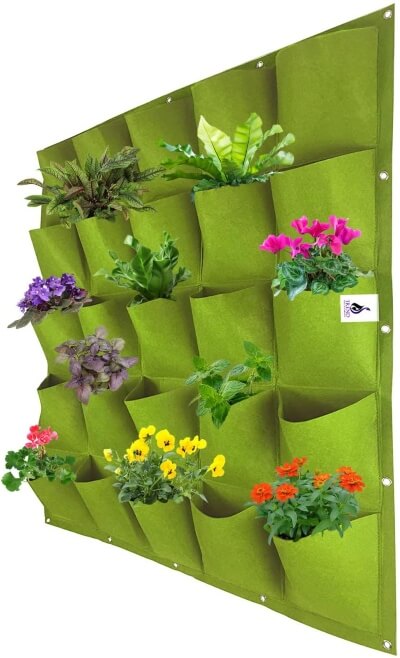
Source: amazon.com.au
This mid-range vertical garden planter from Trend Hutch is designed for convenience above all else. The large pockets reduce how often you need to water, and it’s incredibly easy to hang, covering a full square metre of garden wall with planting space.
The Trend Hutch vertical planter takes less than half an hour to hang with the right tools and is even quicker to plant up thanks to its generous planting pockets.
Pros
Cons
5. AgroSci Garden Wall Planter Kit

Source: amazon.com.au
Agrosci are coming up in the market and competing with the market leader, Worth, for self-watering planters that have a (potentially) much easier hanging system.
On the right walls, you can hang five planting sets with just four screws, and because they attach vertically as well as horizontally, are much easier to retrofit extra modules later on.
What I think still keeps them slightly of the top spot is the design, which just doesn’t look as good as its competitors, although the self-watering system is just as efficient, and the filters included in each package help keep water and soil neatly separate with actively prevents root rot if there’s heavy rainfall.
Pros
Cons
6. Watex Metal Mounted Green Wall Vertical Planter
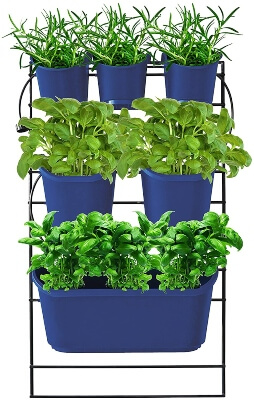
Source: amazon.com.au
These vertical wall pots would be a really sweet addition to a modern kitchen garden, whether it was somewhere for the kids to get into gardening, or as a practical and convenient herb garden just outside the kitchen,
While they don’t have a water reservoir, they can be attached to the hose to watering deep down into the roots, or even set up on an irrigation system so weekly watering is automated alongside your lawn irrigation.
Pros
Cons
7. Watex Mounted Green Wall Mini Vertical Planter
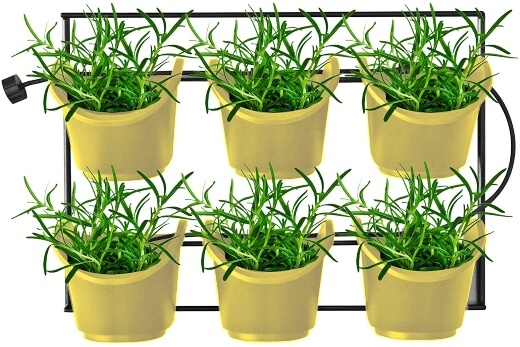
Source: amazon.com.au
Watex is quickly flooding the vertical planter market with innovative self-watering products that link up to existing irrigation systems. If you have none yet, check out our guide on the best irrigation and water systems to find out which you can use in your vertical garden.
These sweet little pots attach to a wall with just a couple of screws and link right onto the hose to keep herbs of flowers well-watered without any effort at all.
Obviously, there are bigger vertical planter systems for the same price, but if it's style you’re after and you prefer something more subtle than a full green wall, then Watex is a great brand to look into.
Pros
Cons
Top Picks for Vertical Garden Planters
Vertical Garden Planter - Our Top Pick


Source: amazon.com.au
Green walls can take years to establish, but this generous 72 pockets vertical garden planter kit makes it far faster to establish a real living wall in your own garden, and the felt pockets are incredibly easy to water.
In terms of budget, size, and instant impact, the 72 pockets vertical planter has to be one of the best vertical garden planters on the market.
Premium Choice Vertical Garden Planter


Source: amazon.com.au
I’ve said in the reviews section already that I adore these vertical planter kits from Worth. Also called Wonderwall planters from the same brand, they are definitely a premium product with a premium price tag, but there is no more efficient system for hanging planters on any surface than this one.
If you want to buy the best vertical garden planter, it has to be Worth.
Best Value Vertical Garden Planter


Source: amazon.com.au
If you’re new to vertical gardening, then start small and get used to how to treat plants in these unusual conditions first. This vertical garden planter from Angtuo is perfect for beginners and doesn’t cost the earth either, making it our best budget vertical planter.
The generous planting pockets help retain moisture, and the felt makes it incredibly easy to water, either from the top down, or just spraying the entire planter once a week.
Vertical Garden Planter FAQs
What are the disadvantages of a vertical garden?
The disadvantages of a vertical garden are that they can hold moisture and humidity against the wall, so on old houses, or timber homes damp problems can occur, but this can be avoided by buying better quality vertical planters with proper drainage.
How often should you water a vertical garden?
Depending on the plants, and the location of your vertical garden planter, you will need to water once a week in summer. Choosing a vertical garden planter with built-in reservoirs can reduce this to once every two weeks, particularly if you choose drought-tolerant plants.
Do green walls help wildlife?
Green walls are brilliant for native wildlife as they provide shelter for insects, and can even create nesting sites for small birds. The insects attract birds, and choosing pollinator-friendly plants can be a big draw to wildlife more generally.
Are green walls expensive?
Green walls are definitely more expensive than standard containers or trellis but are worth the cost. For some systems, you’ll be spending over $40 per square metre, but more basic green wall kits can cost as little as $30 to cover 6 square metres with planting.
Should you be interested using trellis, see our list of Best Garden Trellis Ideas and Kits for 2024.
Start Vertical Gardening Using the Best Vertical Garden Planters for 2024
We’re slowly covering our entire house in a green wall system, buying a little at a time until we can’t see the brickwork anymore. It’s an expensive endeavour but not one we will ever regret.
The drainage is excellent, and it has actually helped to insulate the house, which now loses around 10% less heat in winter from the covered wall, and last summer seems significantly cooler than previous years too.
If you’re considering buying a vertical planter we would 100% recommend it. Any passionate gardener or garden designer will tell you that using vertical space gives you more options, so use our guide above to help you find the best vertical garden planter for you.
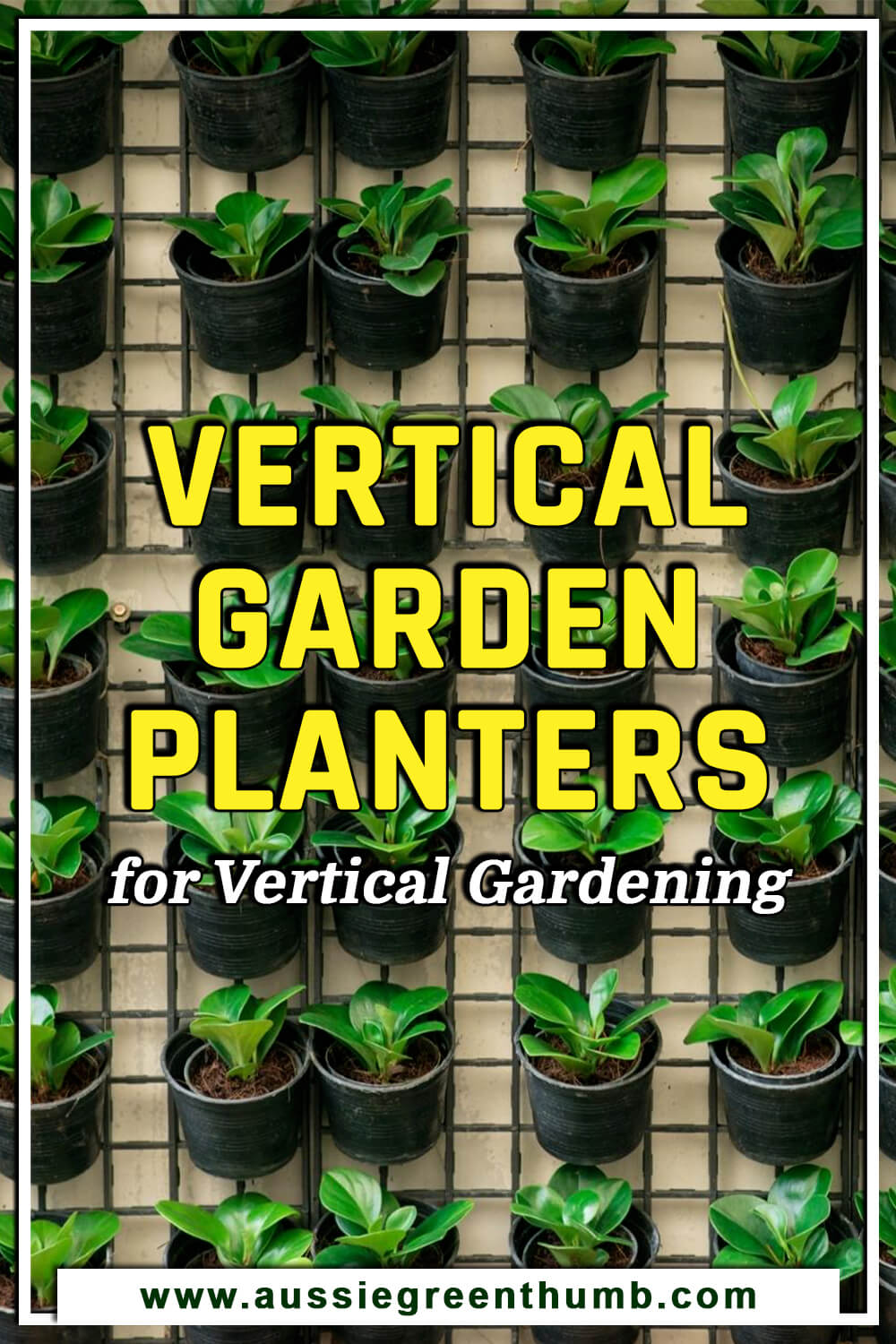
Published on June 10, 2022 by Nathan Schwartz
Last Updated on January 11, 2024

